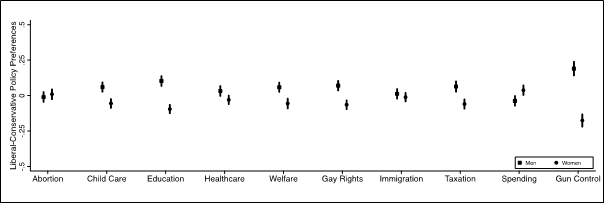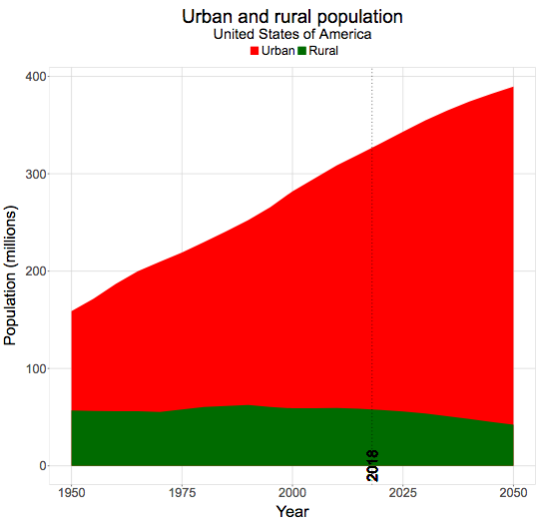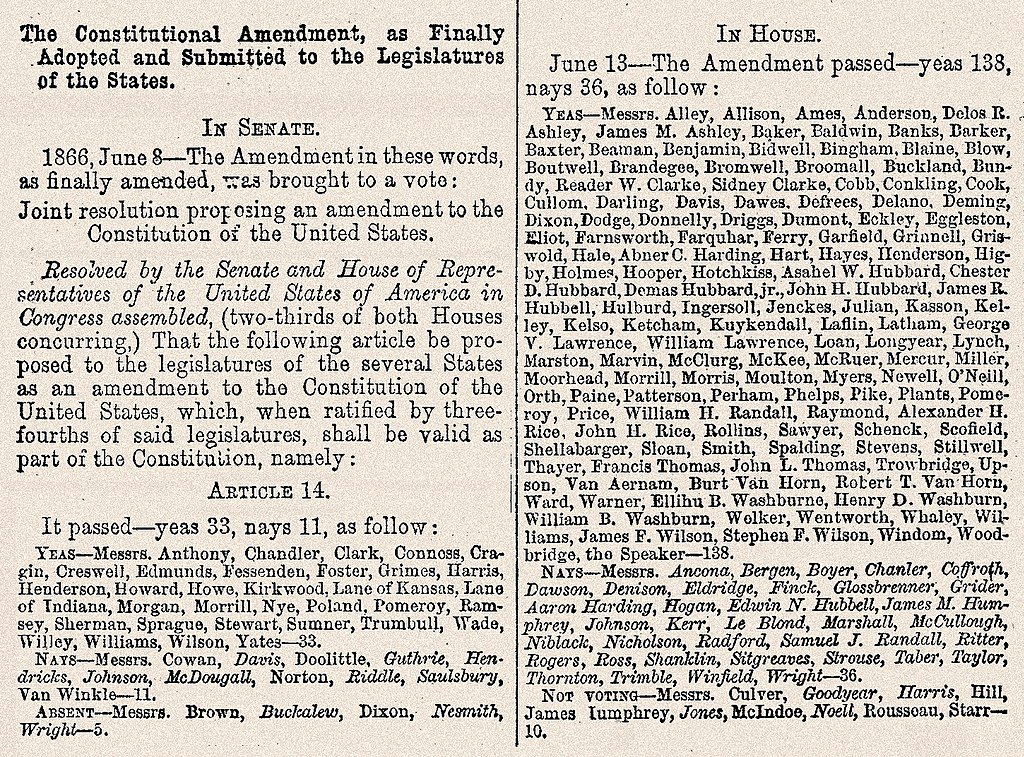Might make for fruitful class discussion when covering political parties.
‘America’s Six Political Parties‘
Link to US Civitas Facebook Discussion Thread
Might make for fruitful class discussion when covering political parties.
‘America’s Six Political Parties‘
Link to US Civitas Facebook Discussion Thread

I could see using the findings reported in this article to frame a discussion about what drives division within American politics. In Ch. 3 of my textbook, I give a modified Madisonian account, arguing that two perennial drivers of division / conflict are ideology and interests. As I’ve told many of you, I plan eventually to add a “third I” to the discussion: (social) identity. But I think this article should give us pause before going as far as many contemporary scholars have gone (e.g., Bartels, Aiken, Druckman, Bolsen, etc.). They are close to contending that, at least in the mass public, it is ALL about social identity. As we see here, it appears that, at least when it comes to sex/gender identity, ideology appears to be an intervening (and more consequential) variable.
‘Why Donald Trump never really had a “woman” problem among Republican voters.‘-LSE US Centre
Link to US Civitas Facebook Discussion Thread
There’s a lot in here to draw from for American Gov classes. Here are just two. (1) The accurate description of political parties as non-homogeneous coalitions of conflicting interests and ideologies. And (2) his reflections on the motives that drove him into politics, and how they have changed over time. He said it started as something of a “sport” for him and then became more about personal “ambition,” but now he sees politics as “a way to make fundamental choices for the country.” This fits well with the discussion in Ch. 3 of American Way of Government and Politics about (a) the different kinds of motives that drive different people into politics and (b) the discussion of whether there is such things as a genuine “politics of principle” or whether cynics are correct that there isn’t.
‘A GOP strategist abandons his party and calls for the election of Democrats‘- Washington Post
Link to US Civitas Facebook Discussion Thread
Great for talking about media ownership, freedom of the press, and democracy. And don’t forget this one either ….
‘Sinclair “must-run” segment on family separation policy and child detention attacks the media‘-Media Matters
Link to US Civitas Facebook Discussion Thread
This would run the risk of appearing partisan, but I think there’s a lot in this video to facilitate class discussion. I’d probably use it during a unit on public opinion and media, with an emphasis on how (and why) would-be authoritarian rulers seek to discredit the media, and also the part about why our traditional media is not well suited for demonstrating something like “democratic backsliding.” It could also be used for discussing “freedoms necessary for democracy” in Ch. 2 of Understanding American Government and Politics…”
Link to US Civitas Facebook Discussion Thread

Maybe it’s not quite as bad as some previous studies suggested.
‘New study finds increase in support for democracy — but weaker support among politically disengaged and conservatives‘-Washington Post
Link to US Civitas Facebook Discussion Thread
This post by William Galston provides a nice summary of Chevron deference — which is the legal basis for much federal agency rule-making discretion — and a preview of an important (even if not publicly salient) impact on federal government lawmaking and policy making Kavanaugh could have as SCOTUS justice. This is also useful for understanding the divide between liberals and conservatives over the proper scope of administrative discretion in a system committed to separation of powers and checks and balances.
‘Under the radar: The Supreme Court decision Brett Kavanaugh is most likely to overrule‘-Brookings
Link to US Civitas Facebook Discussion Thread

This would be useful for discussing issues of representation in the Senate, Electoral College, etc.
‘In about 20 years, half the population will live in eight states‘-Washington Post
Link to US Civitas Facebook Discussion Thread

Shouldn’t there be bipartisan support for this?
‘States slow to prepare for hacking threats‘-Politico
Link to US Civitas Facebook Discussion Thread

This might be kind of fun for discussing basic concepts about laws, the legislative process, and judicial review. I’d consider doing it early in the semester as an overview of basics of government or perhaps specifically when discussing judicial branch. The fact that it’s focused on Georgia and features an interview with a professor at GSU College of Law makes it particularly appealing.
Why Can’t Georgians Live On A Boat For More Than 30 Days? And Other Odd State Laws
Link to US Civitas Facebook Discussion Thread

The 14th Amendment turns 150 today. Put another way, the Constitution we live under today is now 150 years old.
‘The Constitutional Amendment That Reinvented Freedom‘- New York Times
Link to US Civitas Facebook Discussion Thread
:no_upscale()/cdn.vox-cdn.com/uploads/chorus_asset/file/11833599/Foreign_born.jpg)
More on how social identity — here, racial / ethnic identity — can trump (!) ideology and interests.
“This is a dynamic Tesler describes well. “In the post-civil rights era, Democrats needed to maintain their nonwhite base without alienating white voters,” he said. “So their incentive was silence. And Republicans needed to win over white voters without appearing racist. So their incentive was to speak about race in code. The shifts now have made it so Democrats’ incentive is to make explicitly pro-racial equality appeals and Republicans now have an incentive to make more explicit anti-minority appeals.”
Take that idea and extend it out into the coming decades of American politics. The Democratic Party will not be able to win elections without an excited, diverse coalition. The Republican Party will not be able to win elections without an enthused white base. Democrats will need to build a platform that’s even more explicit in its pursuit of racial and gender equality, while Republicans will need to design a politics even more responsive to a coalition that feels itself losing power.”
‘White threat in a browning America‘-Vox News
Link to US Civitas Facebook discussion thread
Lots here on freedom of speech, including the fact that First Amendment applies only to government action and that, therefore, private social media platforms are free to restrict or allow speech at will. (“Censorship,” as a constitutional law matter, is only when government restricts speech.) There is also mention of the fact that “hate speech” is not a legally recognized category of speech. Note, also, the claim that Jones is best contested through an open marketplace of ideas; that the truth will prevail if ideas and facts have a fair chance to be expressed and revealed. You might ask students if they think this actually works in the case of Jones followers, who seem to believe Jones is the arbiter of truth, and that most of the facts and ideas that have long prevailed through the marketplace of ideas are myths fabricated by our conspiring overlords.
Link to PBS Newshour video
Link to US Civitas Facebook discussion thread
I haven’t closely examined this study, but the executive summary is jaw-dropping:
“The Democracy Perception Index (DPI) finds a majority of people around the world feel like they have no voice in politics and that their governments are not acting in their interest (51% and 58% respectively). In particular, they have little faith that their government is formed “by the people” and works “for the people”. / Perhaps most surprisingly, this public disillusionment is higher in democracies than in non democracies. Almost two thirds (64%) of people living in democracies thinks their government “rarely” or “never” acts in the interest of the public, compared with 41% of people living in non-democracies.”
Link to Alliance of Democracies report
Link to US Civitas Facebook discussion thread

This would be great for discussing ideologies and the idea that politics (in my modified-Crickian sense) consists of a set of free nonviolent activities (and that this commitment to freedom and nonviolence sets its apart from other forms of power struggle). Both ideas converge in this discussion of the “alt-right” and “antifa” movements in this thread. On the two-dimensional ideological spectrum that I introduce in Ch. 3, both movements would be low on the vertical axis because they both are authoritarian. But they are literally violently opposed to one another on the left vs. right axis because one seeks to create a white male ethno-state while the other seeks to stop them (because they envision a deeply egalitarian multicultural society).
Link to discussion thread authored by Political Scientist David Neiwert
Link to US Civitas Facebook post
This would be a fun one for discussing federal courts.

Professor Jeff Lazarus on how interests groups like the NRA exert power over the system.
Link to US Civitas Facebook Discussion Thread
/cdn.vox-cdn.com/uploads/chorus_image/image/60410115/508480896.jpg.0.jpg)
Good one for discussing political participation.
Poll: only 28 percent of young voters say they will certainly vote in the 2018 midterms -Vox News
Link to US Civitas Facebook Discussion Thread